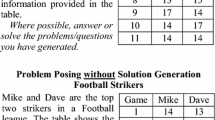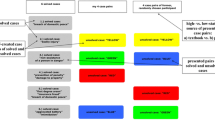Abstract
The main purpose of the present study was to investigate the effects of training in D'Zurilla and Goldfried's (1971)procedure for defining and formulating socially oriented problems on performance in generating alternative solutions for such problems. A second objective was to replicate findings of a previous study which found support for the quantity principle on which the generation of alternatives component of this model is based. Results generally confïrmed the original hypotheses, i.e., training in both these procedures independently increased the quality of solutions generated for two stimulus problems.
Similar content being viewed by others
References
Dewey, J.How we think. Boston: Heath, 1910.
D'Zurilla, T. J., & Goldfried, M. R. Problem solving and behavior modification.Journal of Abnormal Psychology 1971,78 107–126.
D'Zurilla, T. J., & Nezu, A. A study of the generation-of-alternatives process in social problem solving.Cognitive Therapy and Research 1980,4 67–72.
Heppner, P. P. A review of the problem-solving literature and its relationship to the counseling process.Journal of Counseling Psychology 1978,25 366–375.
Mahoney, M. J.Cognition and behavior modification. Cambridge, Massachusetts: Ballinger, 1974.
Nezu, A. Component analyses of three stages of the social problem solving training model.Dissertation Abstracts, 1979,40(2), 929B
Nezu, A. Social problem solving: Applications for real-life situations.Problem Solving 1980,2 2–3.
Nezu, A., & D'Zurilla, T. J. An experimental evaluation of the decision-making process in social problem solving.Cognitive Therapy and Research 1979,3 269–277.
Nezu, A., & D'Zurilla, T. J. Effects of problem definition and formulation on decision making in the social problem-solving process.Behavior Therapy 1981,12 100–106.
Winer, B. J.Statistical principles in experimental design (2nd ed.). New York: McGraw-Hill, 1971.
Author information
Authors and Affiliations
Additional information
This paper is based upon portions of a dissertation submitted by the first author in partial fulfillment of the requirements for the degree of doctor in philosophy in psychology at the State University of New York at Stony Brook. We would like to thank Marvin Levine, John Gagnon, and Marion MacDonald for their helpful suggestions and criticisms concerning this research, and also Michael R. Petronko and Nina M. Wilbur for their helpful comments on an earlier draft of this paper.
Rights and permissions
About this article
Cite this article
Nezu, A., D'Zurilla, T.J. Effects of problem definition and formulation on the generation of alternatives in the social problem-solving process. Cogn Ther Res 5, 265–271 (1981). https://doi.org/10.1007/BF01193410
Issue Date:
DOI: https://doi.org/10.1007/BF01193410




